
Back in person this time, after a “virtual” year of pandemic related absence. It was great to see people again: while a virtual festival has its benefits, such as no shortage of running time, there’s no substitute for watching films on an actual screen. Below you’ll find details of the four features which were screened as part of proceedings. There was a particularly strong international flavour this year, with all but one of them coming from overseas: two were from South America, and a third out of Malaysia.
At the end of the event, the FearCon awards were handed out. The trophy for Best Feature went to Dark Fears. There were also two programs of short films. Best Short went to The Snail and the Audience Favorite award was given to The Last Christmas of the Universe.
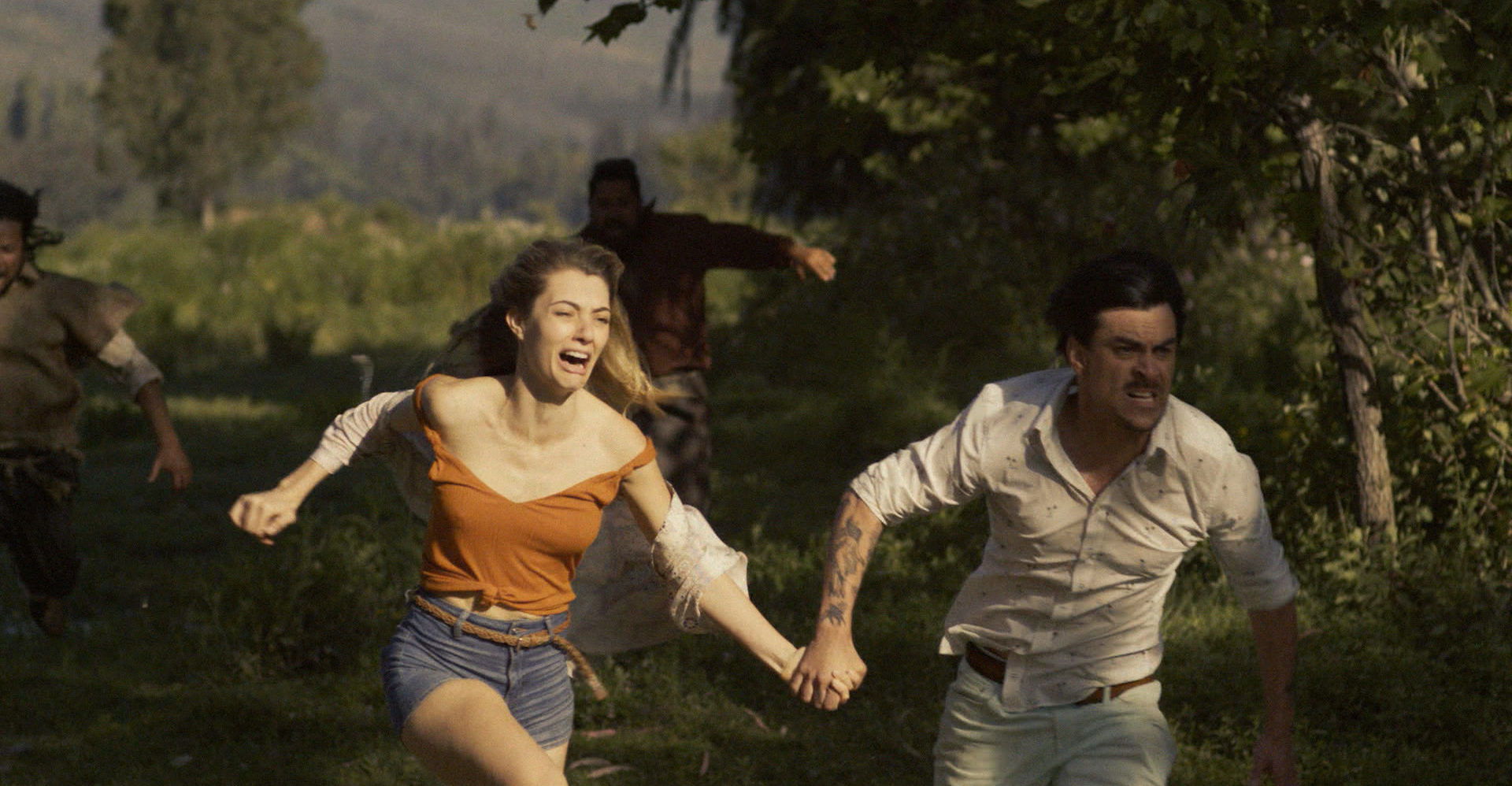
APPS (2021)
 Rating: B-
Rating: B-
Chile
Dir: Lucio A. Rojas, José Miguel Zuñiga, Sandra Arriagada, Camilo León, Samon Marquez
Star: Ignacia Uribe, Tutú Vidaurre, Leonardo León, León Arriagada
If ever there were a poster-child for the variability inherent in horror anthologies, this would be it. The rating above should likely be regarded as a high-water mark, skewed towards the two-and-a-half good episodes out of four which this provides (while there’s a fifth, inter-section segment, this is mostly a woman scrolling on her phone, and doesn’t offer enough content to come to a real judgment). The linking theme is the use of modern Internet technology for evil, though in one case, this is tangential at best.
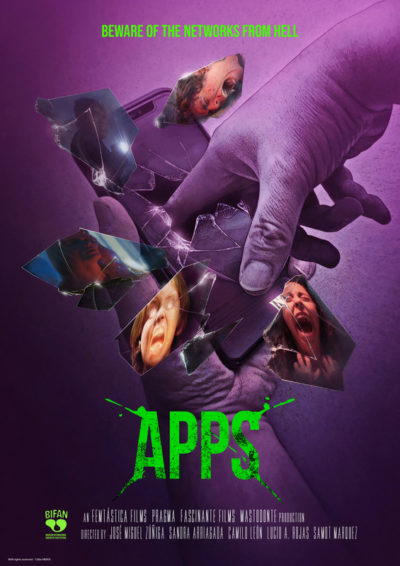 It really hits the ground running: you could make a case the first story, Eye Wolf is the strongest. A group of four men, with the unwilling help of one’s girlfriend, lure another woman to a deserted warehouse, with the aim of raping her and livestreaming it for profit. However, it turns out, their victim (Uribe) is not exactly the defenseless target they expected. This is a snappy, vicious entry, and could easily be a feature on its own. Then, unfortunately, there’s the second, Frequencia, which quickly pisses away all the accumulated goodwill. It has to do with a voyeur (León), who downloads an app that lets him listen to his neighbours. Or something. Because neither I nor Chris could figure out this incomprehensible mess, shot largely in near-darkness.
It really hits the ground running: you could make a case the first story, Eye Wolf is the strongest. A group of four men, with the unwilling help of one’s girlfriend, lure another woman to a deserted warehouse, with the aim of raping her and livestreaming it for profit. However, it turns out, their victim (Uribe) is not exactly the defenseless target they expected. This is a snappy, vicious entry, and could easily be a feature on its own. Then, unfortunately, there’s the second, Frequencia, which quickly pisses away all the accumulated goodwill. It has to do with a voyeur (León), who downloads an app that lets him listen to his neighbours. Or something. Because neither I nor Chris could figure out this incomprehensible mess, shot largely in near-darkness.
But, wait! Just as we were about to dismiss this, Eden shows up, in which a group of five young people head for their AirBNB-like accommodation near a music festival. Except it’s not what it seems on the app. This one goes from zero to holyfuckwhattheshittery in about five seconds, and doesn’t stop thereafter. It’s quite glorious in its unhinged mayhem. Finally, there’s the “half” mentioned above, On Fire; scored as such because I liked it, and Chris was less impressed, calling it a “low-rent Firestarter“. I can see her point, as it’s about a kid (Arriagada) with pyrokinesis. But I liked its tongue-in-cheek style – the young boy uses his ability mostly to disrupt his father’s online dating exploits e.g. by boiling one woman’s silicone implants out of her chest – as well as the mix of animation and live-action.
The fact there are five different directors, one for each segment, does result in a diversity of styles and approaches. Or “inconsistency”, if you prefer, for this is a double-edged sword. When it’s good, you want it to keep going along the same lines; when it isn’t, you’ll find yourself making “hurry up” gestures at the screen. While this is part of the territory for the sub-genre, I’m not sure I’ve seen an anthology where the results are quite so diverse. Despite the loosely unified theme, it feels more like a collection of independent shorts than a cohesive unit. Still, with two bullseyes and an inner ring result, I am prepared to forgive the total misfire of Frequencia.
This review formed part of our October 2021 feature: 31 Countries of Horror. It screened as part of Phoenix FearCon 2021.

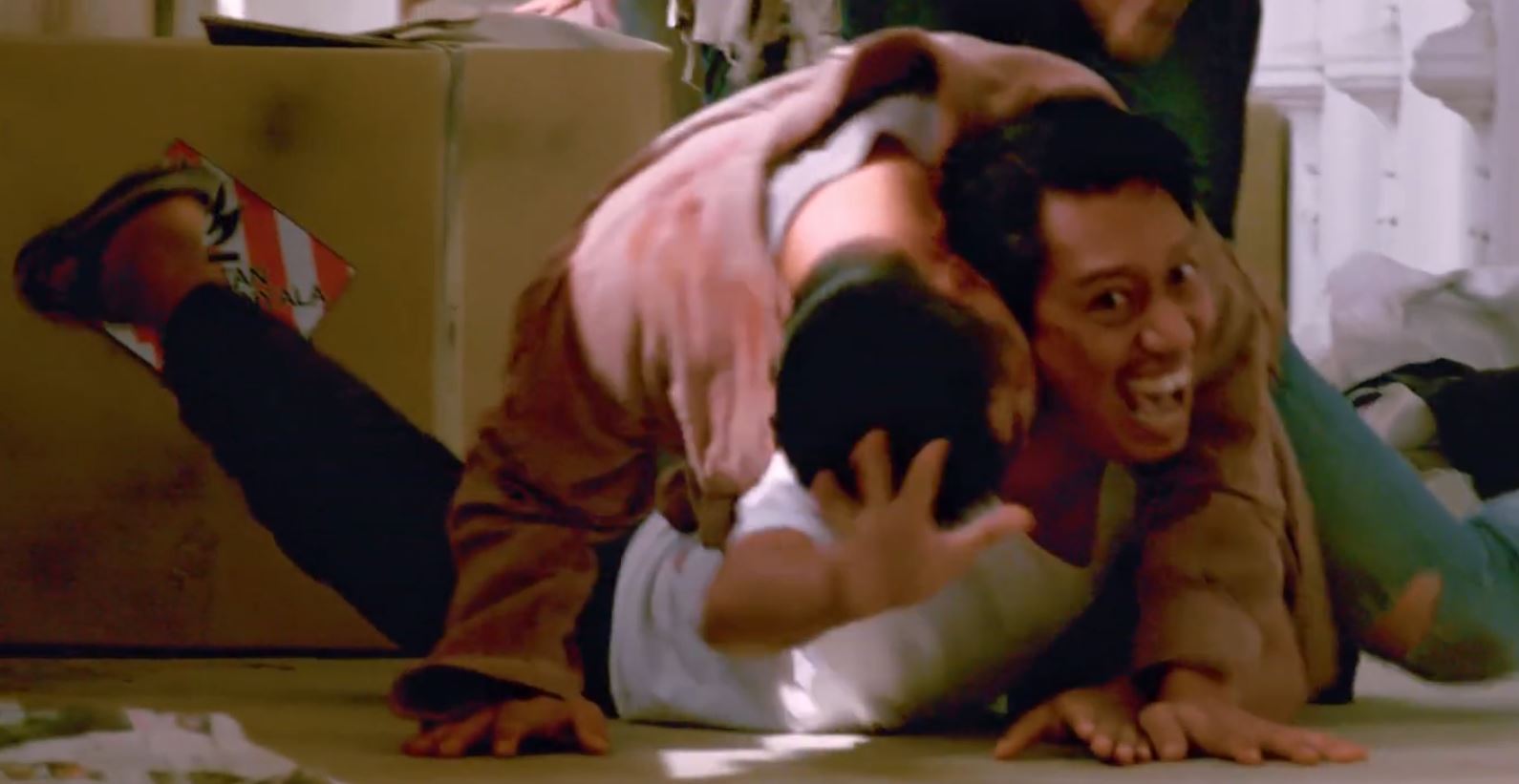
Belaban Hidup: Infeksi Zombie (2021)
 Rating: B
Rating: B
Malaysia
Dir: Ray Lee
Star: Pablo Amirul, Anna Melissa, Nelissa Nizam, Iqbal Danell
a.k.a. Zombie Infection
On the one hand, at its core, this is just another zombie movie. Scientific experimentation goes bad, unleashing a horde of undead flesh munchers on the local community. But what makes this unique is its setting: deep in the Borneo jungle, featuring a largely indigenous cast of non-professionals, and mostly in the Dayak language. It is, perhaps, the kind of zombie movie Werner Herzog would have made. If only Klaus Kinski were still alive, to play the role of Dr. George, the scientist responsible. It is these elements which give it a freshness I found surprisingly invigorating, considering how jaded I am about the zombie genre. Though credit, also, for not hanging about. It’s only a couple of minutes before things kick off, and the participants scatter from George’s lab.
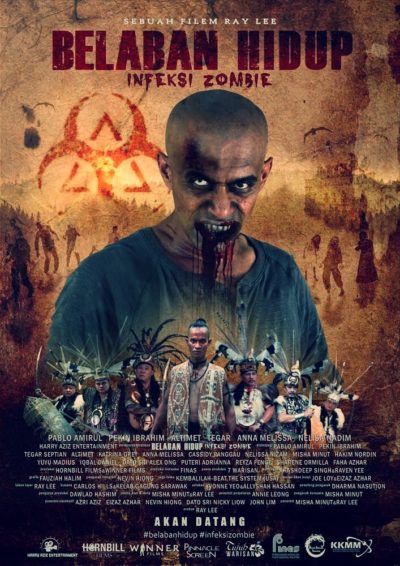 Initially, both they and they film ds seem to be going in several different directions. George’s assistant (Katrina Grey from Daytime Nightmare), is seeking the last enzyme for an anti-virus, while another group head for a shopping mall to look for a relative, and it feels like it’s going towards Dawn of the Dead territory. However, neither prove of much significance. Instead, everyone ends up in the jungle, believing the zombies won’t be able to cope with the uneven terrain. This turns out not to be the case, but it is there the film settles down. It focuses mostly on Gadang (Amirul), son of a village elder, and his efforts to protect his heavily-pregnant wife and daughter from the undead hordes sweeping through the forest.
Initially, both they and they film ds seem to be going in several different directions. George’s assistant (Katrina Grey from Daytime Nightmare), is seeking the last enzyme for an anti-virus, while another group head for a shopping mall to look for a relative, and it feels like it’s going towards Dawn of the Dead territory. However, neither prove of much significance. Instead, everyone ends up in the jungle, believing the zombies won’t be able to cope with the uneven terrain. This turns out not to be the case, but it is there the film settles down. It focuses mostly on Gadang (Amirul), son of a village elder, and his efforts to protect his heavily-pregnant wife and daughter from the undead hordes sweeping through the forest.
The title translates as “Fight for Life: Zombie Infection”, and that’s an appropriate summary. There’s not a lot of down-time here, with rarely more than a few minutes between attack sequences. Admittedly, if you’re expecting modern levels of gore, it will seem tame; it’s more Night of the Living Dead than Dawn in the splatter department. However, the pace helps compensate for this, and Lee makes great use of the surroundings. Shots of the zombies moving through the mist-shrouded foliage are genuinely creepy, and their make-up is better than I expected too. Indeed, the whole thing is well-crafted from a technical aspect, and Amirul makes for a sympathetic hero.
I will say, the ending did feel somewhat abrupt – without explicit spoilers, I expect any sequel to be subtitled “Trouble Downstream”. Some threads are just abandoned, like the search for the anti-virus, and the film all but forgets about the characters who drove the story in its first half. All told, the plot could have used some tightening in these areas. However, it does have what I found to be one of the more emotional partings in any zombie film. Melodramatic? Perhaps. Yet it worked on me. There’s also something very cool about sitting in Arizona, and watching the first zombie film made with locals in the Borneo jungle. If the plot is nothing new, the other aspects more than make up for that, and the effort by everyone here is deserving of much respect.
This review formed part of our October 2021 feature: 31 Countries of Horror. It screened as part of Phoenix FearCon 2021.

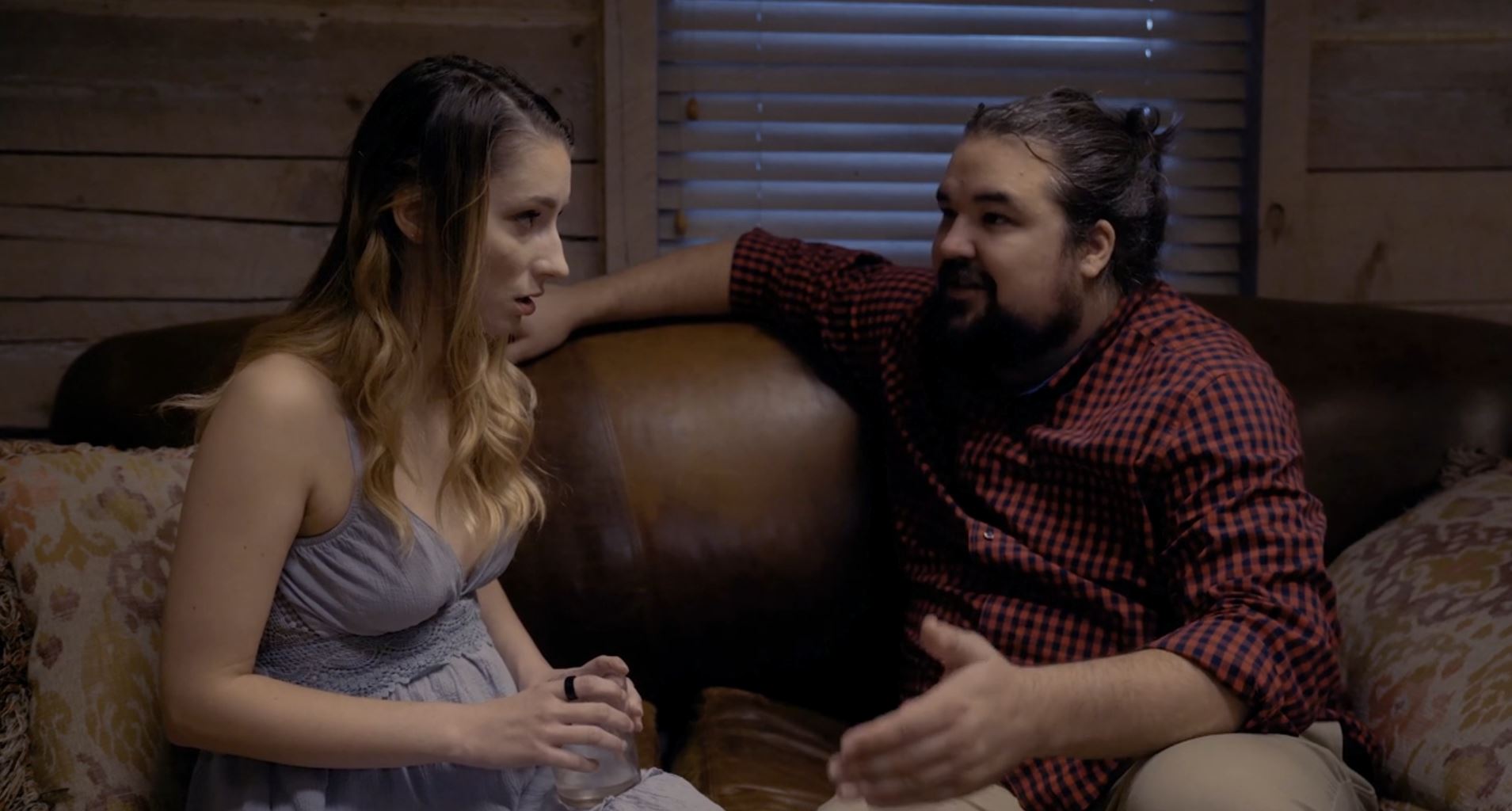
Reset (2021)
Rating: B
Dir: David Sumner
Star: Alyssa Corella, Ben Barlow, Earl Sumner, Bryna Vogel
The high-concept here might best be described as a cross between The Silence of the Lambs and Groundhog Day. Danielle (Corella) is at a party, which ends with her being abducted by Edgar (Barlow). He’s an incel who is seeking a soul-mate, and believes Danielle is The One, after seeing her profile on a dating site. She wakes up in his guest bedroom the next morning, but her subsequent escape attempt ends in her demise at his hands. It’s therefore a bit of a shock when, after a brief interlude with her late grandfather, she wakes up in his guest bedroom, as if nothing had happened, and Edgar repeating saying exactly the same things he said, when she first regained consciousness.
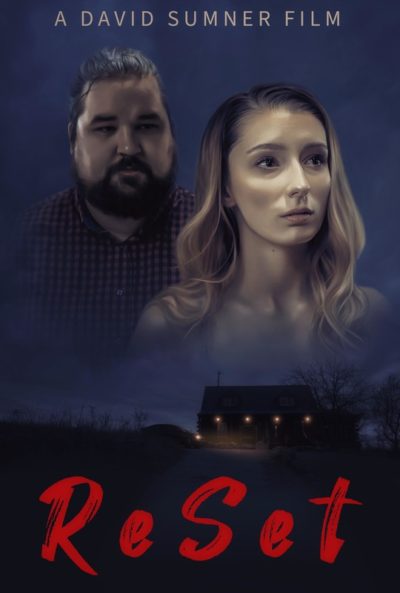 I will say, if you’re not paying total attention, you might not figure out the time loop immediately: it might have benefited from a particular marker (something like – and I’m just spitballing here – a Sonny and Cher song?) to signify the resetting. But once you get your brain around the concept, it’s entertaining to see Danielle working through the problems of her confinement, such as the way Edgar seems always one step ahead of her. Given this is basically two actors in one location for the vast bulk of the movie – it doesn’t hang around, with the first cycle beginning less than ten minutes in – the script does a good job of ringing the changes. Sometimes Danielle tries force; sometimes stealth; sometimes provocation. Each time, she learns a little more.
I will say, if you’re not paying total attention, you might not figure out the time loop immediately: it might have benefited from a particular marker (something like – and I’m just spitballing here – a Sonny and Cher song?) to signify the resetting. But once you get your brain around the concept, it’s entertaining to see Danielle working through the problems of her confinement, such as the way Edgar seems always one step ahead of her. Given this is basically two actors in one location for the vast bulk of the movie – it doesn’t hang around, with the first cycle beginning less than ten minutes in – the script does a good job of ringing the changes. Sometimes Danielle tries force; sometimes stealth; sometimes provocation. Each time, she learns a little more.
A lot of this stands or falls on the two leads. Barlow is competent, and provides a disturbingly plausible portrayal – yet one that occasionally evokes sympathy, or at least pity. Well, except his hair: we knew he was a bad guy as soon as we saw the manbun. But it’s Corella who is increasingly effective (once we get part the awkward and unconvincing party scene, anyway), becoming more likable as the film goes on. She’s smart, and easy to root for, as she slowly puts together the pieces that allow her to counter her captor. The only weak link is her grandfather, whom I’m guessing is played by the director’s father. Have we learned nothing about casting family members from The Godfather III?
Snark aside, this is a good example of recognizing your limitations and working within them. I’ve seen my share of low-budget movies that try and do too much; it rarely works, and they consequently end up spreading themselves perilously thin. This has, instead, opted to tell a story which won’t be hampered too badly by resources. My main criticism: there were parts where more blood seemed very much warranted, and the final fight between Danielle and Edgar was disappointingly tame. The trailer also does a poor job of selling the film too. But considering it’s a first feature for many involved, it’s more than competent, benefiting from a strong idea and central performance, which carry it over the occasional rough patch.
Screened as part of Phoenix FearCon 2021.

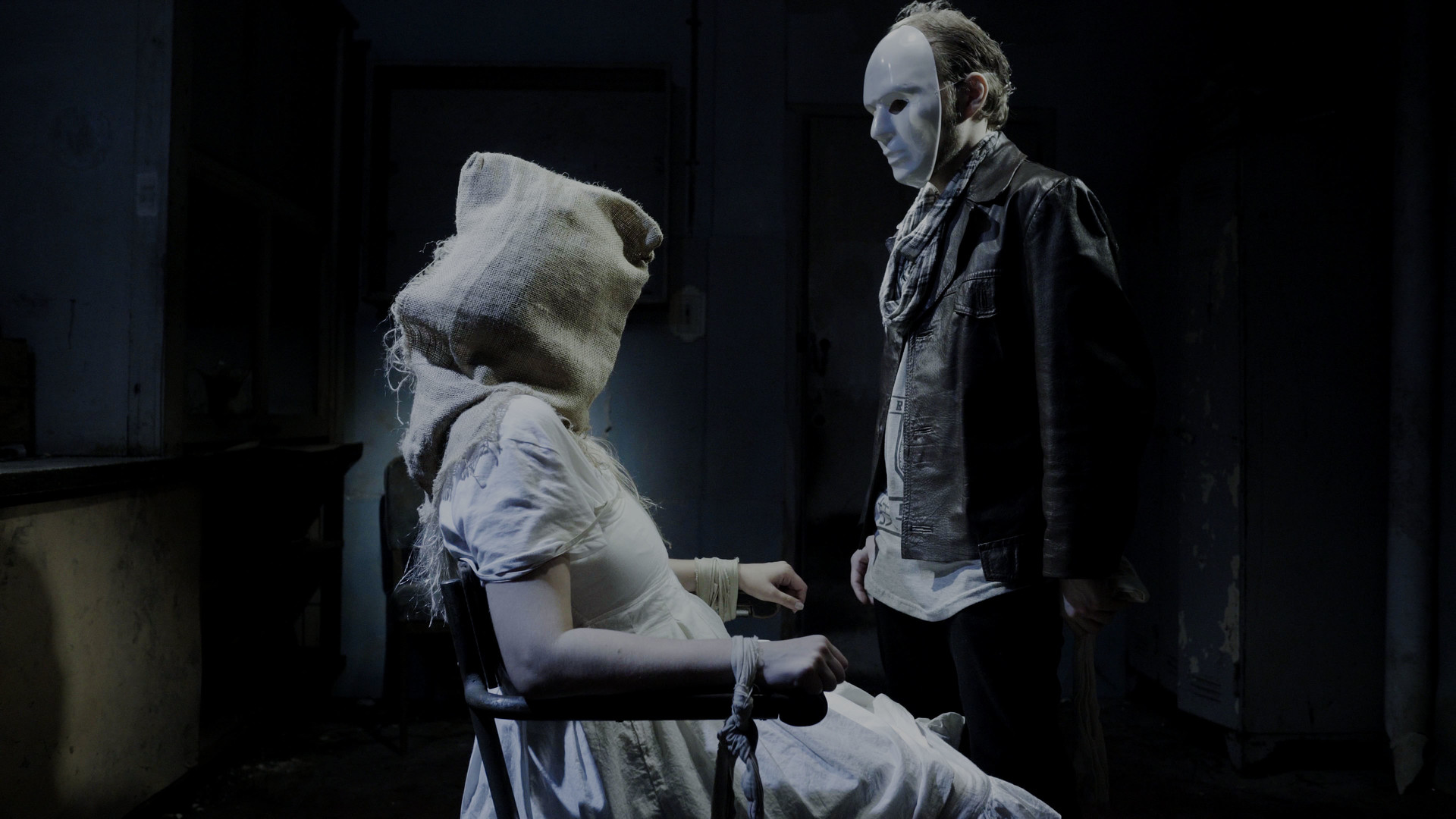
Dark Fears (2021)
 Rating: B
Rating: B
Argentina
Dir: Gabriel Musco
Star: Fabio Rosenstein, Grace Ulloa, Nahuel Yotich, Ana Borasi
a.k.a. El Oscuro Lugar Donde Habitan
The slightly-more verbose (and less generic) original title translates as “The dark in which they live”, and provides a little more insight into the approach here. It’s about a group of four kidnappers, led by Martin (Rosenstein), who make their living by abducting people and holding them for ransom. However, Martin’s son is in need of an expensive operation, and so they decide to up the stakes. The gang obtain information about a young woman, Jessica (Ulloa), with a rich father, and pounce as she’s tending the garden at her home. But almost as soon as they get her back to their liar, things start to go wrong.
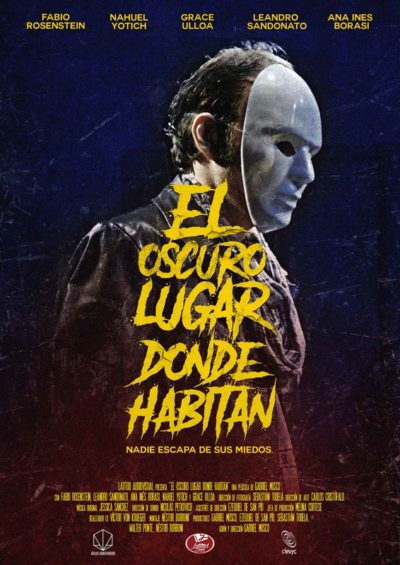 Most obviously, they can’t get in touch with the father, and when they re-visit the house, it’s now completely empty. Martin sends his brother Javier (Yotich) to try and figure out what happened – that is at least relatively prosaic, compared to the weirdness unfolding in their hideout. There, each member of the gang begins to endure experiences that make them confront their fears, from spiders through clowns to their time in prison. It gradually becomes clear that their abductee is not the innocent young girl she seems, as Javier discovers when he locates her father. As the old saying goes, Jessica is not locked in with them. They’re locked in with her.
Most obviously, they can’t get in touch with the father, and when they re-visit the house, it’s now completely empty. Martin sends his brother Javier (Yotich) to try and figure out what happened – that is at least relatively prosaic, compared to the weirdness unfolding in their hideout. There, each member of the gang begins to endure experiences that make them confront their fears, from spiders through clowns to their time in prison. It gradually becomes clear that their abductee is not the innocent young girl she seems, as Javier discovers when he locates her father. As the old saying goes, Jessica is not locked in with them. They’re locked in with her.
The concept of everyone being put in a supernatural situation where they are faced with whatever terrifies them most isn’t particularly new. For instance, it was used on at least two episodes of Buffy the Vampire Slayer. But it seems to show up on TV more than films; oddly, I couldn’t find a case of a horror movie using it. Certainly, here it’s done with some style, opening with a scene of a woman being compelled to commit suicide [its significance may slide past: it wasn’t until the next morning that I suddenly went, “Oh!”] After that, it looks more like a thriller for the next 20-30 minutes. The horror elements only gradually rise up, as we find the kidnappers have made a terrible mistake in their choice of victim.
It definitely takes a more psychological than physical approach to terror, and will likely resonate most with those who have phobias of their own. But even as someone who doesn’t (except for wasps… and that’s a perfectly rational fear, thank you very much), this succeeded in crawling its way under my skin, courtesy of the well-built increasing sense of menace. Having Martin carry out the kidnapping for altruistic reasons definitely helps in terms of keeping the audience sympathetic with the criminals. Though this does teeter a bit when they discuss cutting their losses and killing Jessica in cold blood. Certainly, in some cases, they perhaps do deserve their terrifying fates. I’ll still be crossing “kidnapper” of my list of potential occupations for now.
This review formed part of our October 2021 feature: 31 Countries of Horror. It screened as part of Phoenix FearCon 2021.

